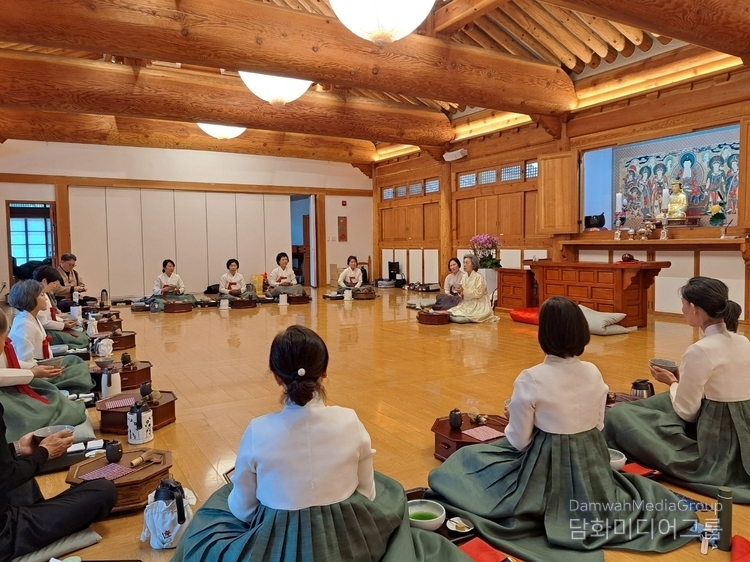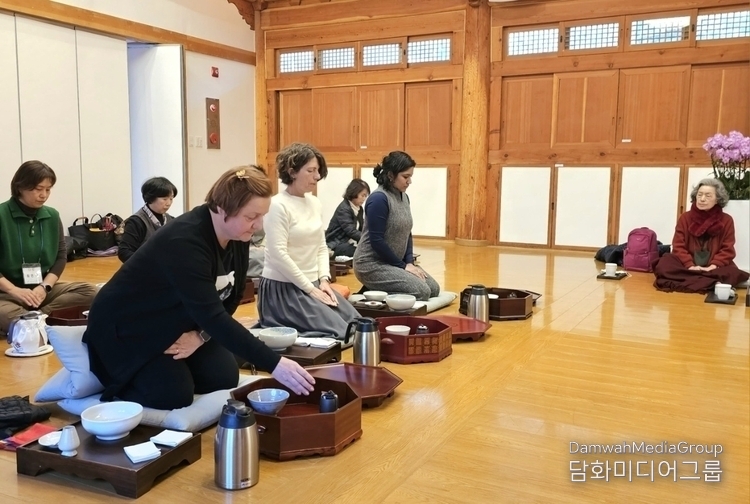By Diplomacy Journal Lee Jon-young
With a thousand-year history, Jingwansa Temple was built by King Hyunjong of Goryeo to repay the favor of Jingwanjosa, who saved his life before he ascended to the throne, and was a fundamental source of Suryuck ceremony during the Joseon Dynasty.
500 years ago, Jingwansa's doenjang (soybean paste) was so famous that it was served to the king. Today, Jingwansa Temple, a favorite of foreign dignitaries, is attracting attention as a training space for temple stays where foreign ambassadors' wives experience tea ceremony education through healing and experience.

In addition, the tea ceremony education program, which invites the chairman of the board of directors, Kim Eui-jeong, who holds a royal tea ceremony ritual, has become popular among foreigners. The February 2024 issue of Tea World takes a closer look at the matcha experience of foreigners led by Myeongwon Cultural Foundation.
Jingwansa Temple, which has a thousand-year history, was built by King Hyunjong of Goryeo to repay the favor of Jingwanjosa, who saved his life before he ascended to the throne, and was a fundamental source of Suryuck ceremony during the Joseon Dynasty.
Jingwansa Temple in Mountain Bukkhsan has recently been receiving a lot of foreign visitors in Korea who want to learn the art of matcha tea ceremony. When we talk about matcha tea ceremony, Japanese tea ceremony comes to mind first, but Korean matcha tea ceremony is gaining popularity. Surprisingly, most of the foreigners who want to learn Korean matcha tea ceremony are Korean ambassadorial wives.

The fact that such sophisticated ambassadorial wives have fallen in love with Korean matcha tea is largely due to the fact that Korean matcha tea is becoming known internationally.
The tea organization that leads the Jingwansa Temple tea ceremony is led by Myeongwon Cultural Foundation (Chairman Kim Eui-jeong), which holds a tea ceremony education every Tuesday, and Amma Tamer, spouse of the Ambassador of Türkiye to Korea, has fallen in love with matcha.
She would put the right amount of powdered tea into the dawan (a bowl used to drink tea), and hold the matcha in her hands and drink it. After watching her stirring so effortlessly, I approached her and asked her what motivated her to get into matcha.

Amma Tamer had an interesting story to tell. "I was reading a magazine and saw a picture of a cup of matcha tea with blue bubbles rising over a dawan, and when I heard that Myungwon Cultural Foundation was offering tea ceremony training at Jingwansa Temple, I immediately signed up. I brewed the tea and tasted it, and it was so delicious."
Chairperson Kim Eui-jeong said it was rewarding to see the wife of the Ambassador of Türkiye to Korea so happy.
Other foreigners who have taken part in the Jingwansa tea ceremony training include the wife of the Czech Republic's ambassador and the president of the British Ladies' Association, Emma Rooke Roberts, a photographer, the wife of the branch manager of Lufthansa Airlines, and a student from the University of Nottingham in the UK.

Japanese matcha is the center of attention when it comes to matcha, and as there is a record of Goryeo Dynasty treating foreign envoys with matcha, it seems that Korean matcha is not far from making an impact on the world stage.
"I'm happy to be able to teach foreigners the tea ceremony method of Myeongwon Cultural Foundation," said Myeongwon alumna Jeong Seo-mi, who leads the tea ceremony training at Jingwansa.
Jingwansa Temple is attracting attention for its healing and experiential temple stay for foreigners. In addition, Myeongwon Cultural Foundation's Paljeongseon tea and matcha tea ceremony training has become popular among foreigners.
As a representative tea organization in Korea, Myeongwon Cultural Foundation is leading the way in spreading tea culture by introducing foreigners to Korean tea. The matcha tea ceremony blowing on the mountain temple made me feel the fragrance of a thousand years of Korean tea culture.






